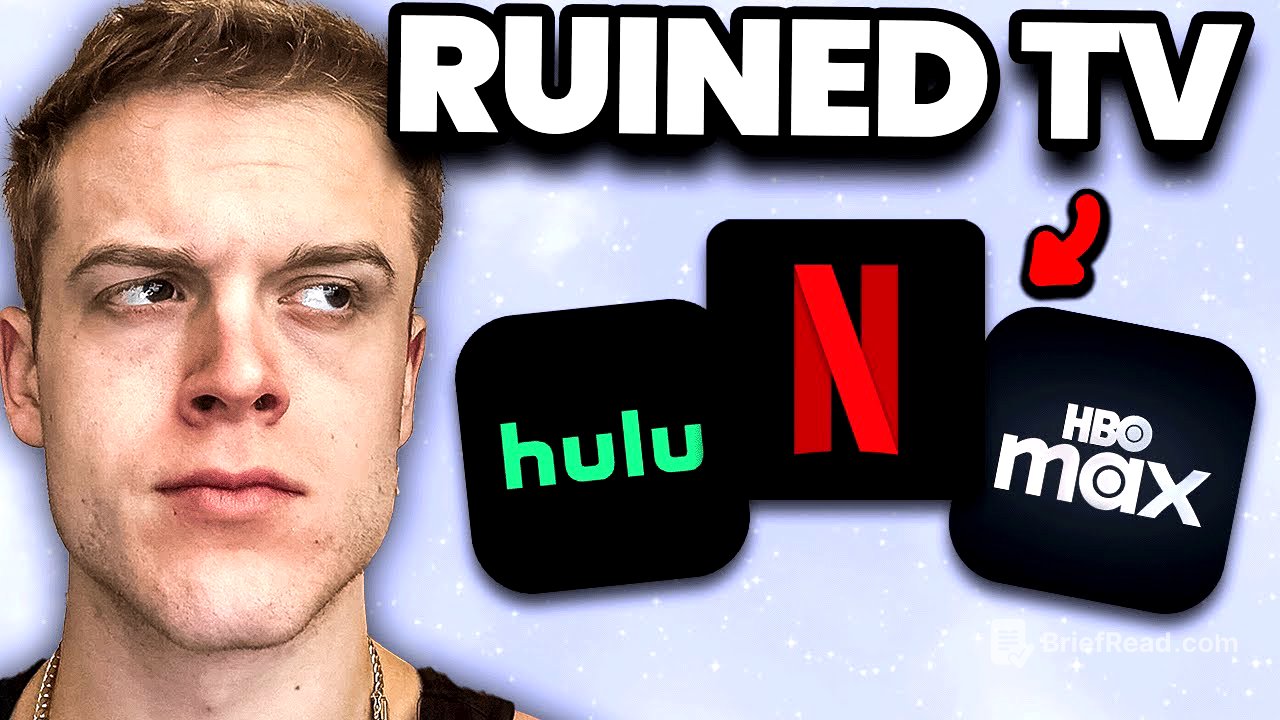TLDR;
This video discusses the current state of streaming services and the resurgence of piracy as a result of increasing prices, confusing service offerings, and a shift in focus from customer satisfaction to maximizing profits. The video explores the history of streaming, the rise and fall of Netflix, the fragmentation of the market, and the growing frustration of consumers who feel compelled to pirate content due to the high costs and poor value of legal streaming options.
- Streaming services are increasing prices and adding ads, leading to consumer frustration.
- Piracy is on the rise due to the high cost and inconvenience of legal streaming.
- The focus of streaming companies has shifted from customer satisfaction to maximizing profits.
- The video gaming industry faces similar issues with subscription-based access rather than ownership.
- There is a growing sentiment that "if buying isn't owning, then piracy isn't theft."
Intro [0:00]
The video starts by stating that streaming was a mistake due to rising costs and service fragmentation. Instead of paying a reasonable price for a comprehensive service, consumers now face multiple subscriptions with increasing fees. The speaker expresses frustration with Netflix's price hikes and the overall state of streaming.
The Proliferation of Streaming Services and Rising Costs [0:08]
The speaker discusses the cost of various streaming services, including Netflix, Paramount Plus, Peacock, Disney Plus, and Hulu, highlighting the increasing prices. Hulu is mentioned as having multiple versions (ad-free, with ads, and premium), with the speaker recalling a past deal where college students could get Hulu and Spotify for a discounted rate. The speaker expresses frustration with Hulu's ad-supported version and the limited content available without the premium subscription. The proliferation of streaming services and their competition leads to rising prices, impacting consumers, especially with inflation and economic challenges.
The Resurgence of Piracy [1:18]
Piracy is growing due to the increasing number of streaming services and rising prices. Modern piracy offers high-quality rips, unlike the low-quality versions of the past. The speaker questions the value of certain streaming services like Paramount Plus, noting that sports and reality TV seem to be their main draws. Companies prioritize profits over providing value, leading to increased piracy. Piracy websites have seen a 12% increase in traffic as people find it easier and cheaper to pirate content.
Netflix's Role and the Downfall of Streaming [4:17]
Netflix was revolutionary when it first came out, but now it has a limited library outside of its originals like Squid Game and Stranger Things. The speaker suggests Netflix should focus on sports content. The downfall of streaming services is attributed to the emergence of numerous platforms like Peacock and Paramount, which fragmented the market. These platforms realized they could create their own streaming services instead of licensing shows to Netflix. The speaker suggests consolidating streaming services to four major platforms to improve the situation.
The Office Leaving Netflix: A Turning Point [9:18]
The departure of "The Office" from Netflix marked a significant downturn for streaming services. Streaming services were lucrative during the pandemic, but as contracts expired, other platforms saw an opportunity to acquire popular shows. A bidding war ensued for "The Office," with Peacock ultimately winning with a $500 million deal for five years. The speaker questions the value of "The Office" compared to other shows. The speaker says that to continue watching the show, viewers were forced to subscribe to a new service or resort to piracy.
Piracy and the Concept of Ownership [11:35]
The speaker brings up the phrase "If buying isn't owning, piracy isn't theft" in the context of both streaming and gaming. Some game companies lease games instead of selling them, leading to frustration. Streaming services lack a strong library of good shows beyond the trending ones. The speaker compares the content quality of Netflix, Amazon Prime, and Hulu, noting that Netflix has a lot of bad content.
The Cost of Streaming and the Rise of "Enshitification" [14:10]
The average American pays for three to four streaming services per month. Amazon Prime is considered valuable due to its delivery benefits and other perks. Some people go to extreme lengths to access content legitimately, such as using VPNs and foreign phone numbers to create accounts in other countries. Piracy is often easier, quicker, and cheaper. The speaker introduces the term "enshitification," which describes how once-great companies offer increasingly deteriorating services as their need for growth outweighs customer satisfaction. Netflix only streams in 1080p, and you have to pay more for 4K.
Ads and YouTube Premium [17:18]
The speaker argues that the problem with piracy is the presence of ads in paid services. YouTube Premium is highlighted as the best streaming service due to its ad-free experience and access to YouTube Music. The speaker criticizes YouTube for adding too many ads to videos, even though they manually delete many of them. Streaming companies will blame everything but themselves for piracy. The preferred approach now is to subscribe to one or two streaming services and pirate the rest.
The Shift in Priorities and the Loss of Ownership [21:34]
The shift in priorities from consumer satisfaction to maximizing shareholder value has revived the sentiment that "if buying isn't owning, then piracy isn't stealing." The speaker reminisces about owning physical media like DVDs and laments the lack of ownership in the digital age. Social media content is also not owned by the users. Streaming services offer convenience but do not allow ownership of content.
Gaming Subscriptions vs. Streaming Movies [23:56]
The speaker expresses more concern about the lack of ownership in video games than in movies. Subscription services for single games are criticized, except for games like Geogesser, which is a constantly updated service. Xbox Game Pass is acceptable because it provides access to many games. The speaker would pay a monthly fee to play Call of Duty because they only play it for a few months and don't want to own it long-term.
The Consequences of Losing Access and the Appeal of Piracy [27:24]
Losing access to a digital library due to payment issues can be devastating. The emotional connection to shows and music is lost when content is only on loan. The speaker states that in the United States alone, passwords were shared over 1.3 million times. People choose piracy because it offers free access to content without fear of losing it. The speaker is not supporting piracy but stating the facts.
Gen Z and Piracy [30:14]
Gen Z loves piracy, but many lack the technical skills to do it. Despite being tech-native, many Gen Z members have only basic knowledge of how technology works. This makes it harder for them to pirate software and movies, but they are willing to learn. Subreddits, Telegram, and YouTube tutorials help them catch up on piracy.
The Streaming Business and the Fear of Piracy [32:13]
Media companies are terrified of piracy. Netflix has admitted this in reports to investors. The streaming business is competitive, with platforms burning millions to stay alive. Apple TV and Peacock have lost significant amounts of money. Twitch also loses millions of dollars every year. Despite stock value losses, streaming companies often make up for it in subscriptions. Consumers are spending more on streaming than ever before.
Combating Piracy and the Importance of Customer Satisfaction [35:03]
Companies are trying to combat piracy, but it's a challenge. The speaker references anti-piracy ads from the past, noting their hypocrisy and ineffectiveness. The Pirate Bay opened in 2003, and by 2005, millions were downloading pirated content. Streaming services should focus on making subscriptions more affordable. A new bill could force other content, costing Hollywood billions yearly. Some piracy websites receive more traffic than Disney Plus and Crunchyroll. The only way to win users and retain loyalty is through customer satisfaction.
The Future of Streaming and the Need for Change [39:59]
The speaker questions why streaming companies don't lower prices to retain customers. Red Lobster is given as an example of a company that improved its business by listening to customer feedback. Streaming services have become complicated and confusing. The speaker hopes that streaming platforms will see users as real people and focus on providing entertainment rather than just increasing stock prices.









